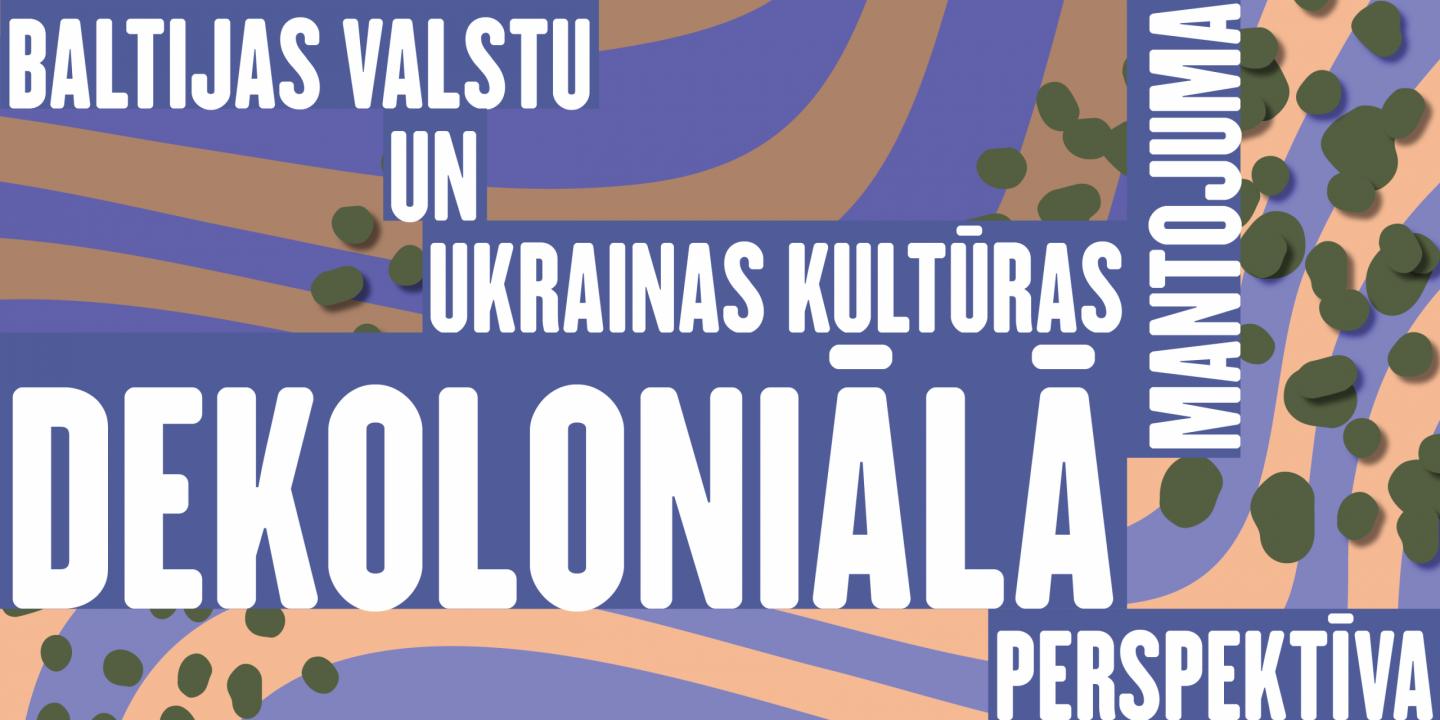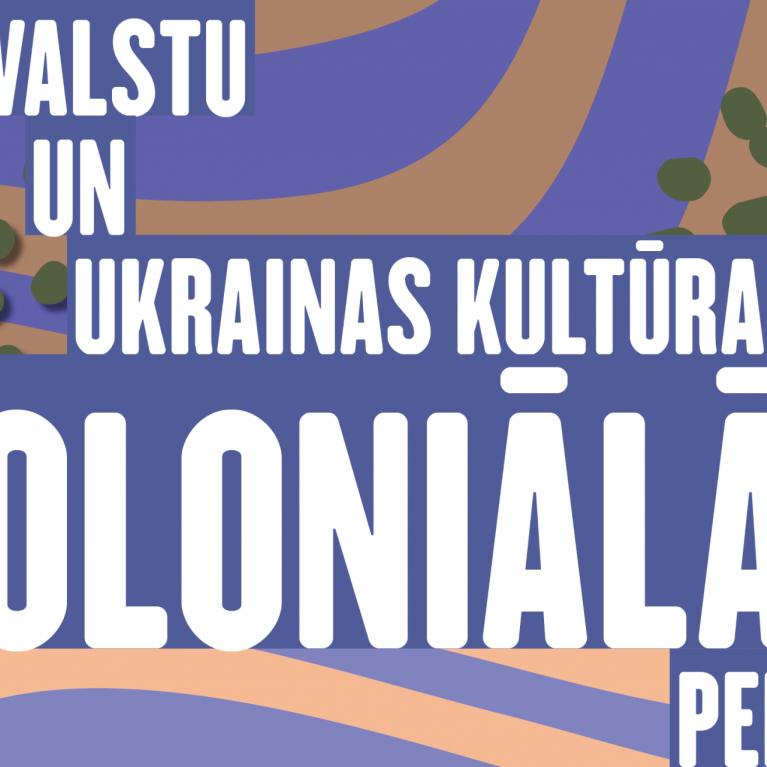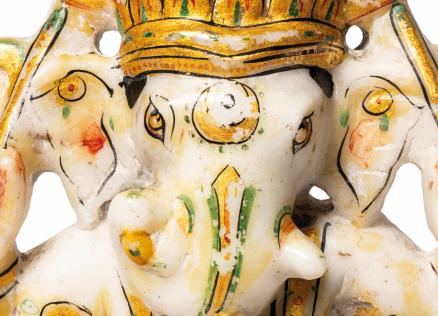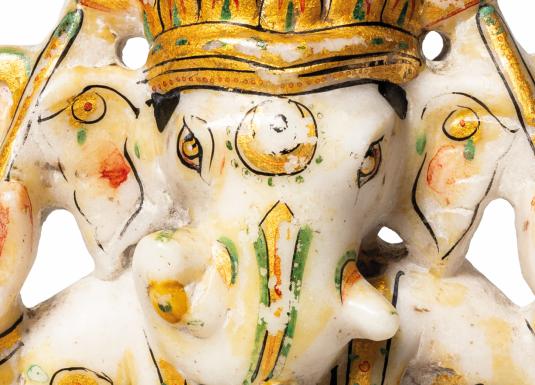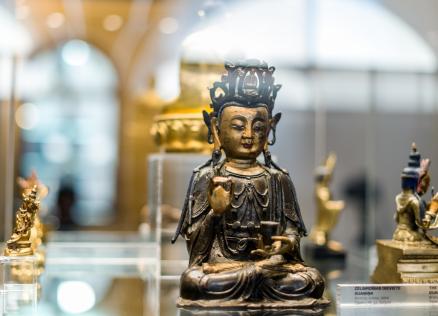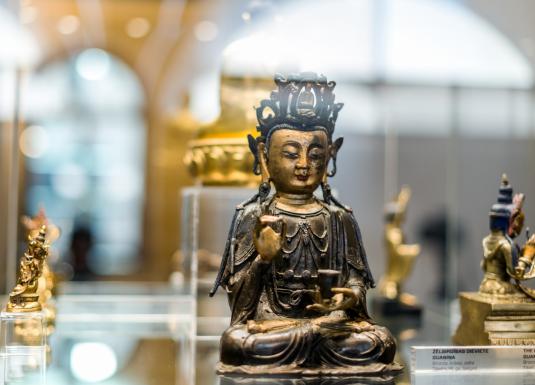International Conference:
Decolonial Perspectives on the Cultural Heritage of the Baltic States and Ukraine
On 5 September 2025, the Art Museum Riga Bourse (AMRB) will host the conference "Decolonial Perspectives on the Cultural Heritage of the Baltic States and Ukraine". The conference was prompted by the observation that visitors to public memory and cultural institutions in our region, and often the professionals who work there, still tend to view and interpret the cultural heritage of the whole world based solely on the Western European experience, which for centuries has shaped ideas about what colonisation means and what it does or does not refer to. In Baltics there is also the overlay of the Soviet occupation period.
The conference will bring together researchers from Latvia, Lithuania, Estonia and Ukraine. The experience of Ukrainian museum colleagues in wartime resisting the rewriting of history in favour of the aggressor state is another relevant aspect of decolonisation, and it is important to give a voice to this as much as possible.
The current issues of the conference theme from the Baltic perspective are mostly related to the decolonisation of knowledge: changing the Eurocentric perspective in research and exhibition concepts, the colonial character of the Soviet occupation period, the involvement of communities in the development of exhibitions, the diversity of narratives, contextualising collections, revising language and terminology, critical attitudes towards the sources of information used in research.
The conference is a continuation of the successful projects already carried out by the AMRB in this field: the educational programme for secondary school students "Words Matter" and the new exhibition on Indian art, developed together with the Indian community.
The working languages of the conference are Latvian and English. For the sake of wider accessibility, simultaneous translation from/to Latvian / English is planned for the conference.
The conference presentations will also be available online via the Zoom platform. To receive the access link, please fill out the registration form.
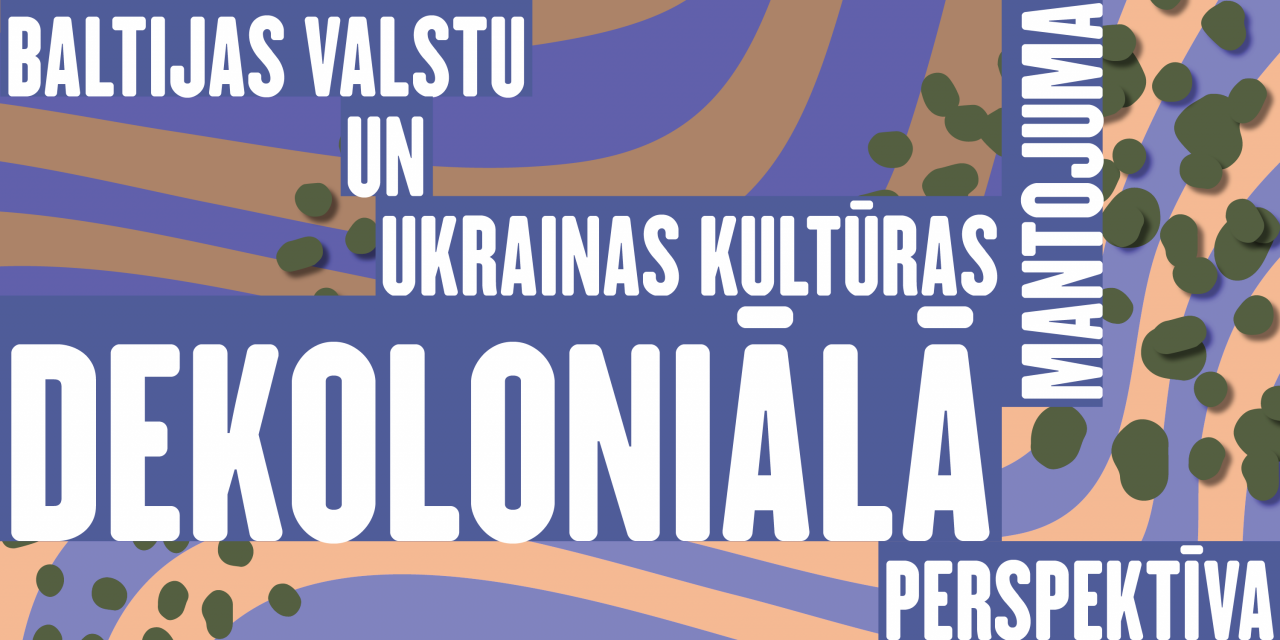
Programme
10.00–10.30
Registration
10.30–10.40
Opening speech
Daiga Upeniece, Head of the Art Museum RIGA BOURSE
10.40–11.15
Insights on Decoloniality and Subjectivity
Tanel Rander, Artist, Curator, Writer, Estonia
This paper is about Rander`s former decolonial orientation and the way how it has transformed during the last and the current decade. He is creating a timeline of his artistic activities and will have insights on some parts of it. He calls it a process of unlearning with an aim for resolution. Perhaps his engagement with decoloniality emerged from that aim. And perhaps some contents of decolonial option can be reached through his personal motivations.
Tanel Rander’s artistic interests are related to subjectivity and his approach is often theoretical, but also experiential and performative. Since 2011 his work was mostly focused on East European identity and decolonial option, but in recent years he is mostly interested in psychoanalytical approaches on subjectivity. He is currently studying expressive art therapy in Ljubljana.
11.15–11.50
Inviting Decolonization: Students, Educators, and Museums in Dialogue
Gražina Bielousova, Scholar, Assistant Professor, Vytautas Magnus University (Kaunas), Vilnius University Institute of International Relations and Political Science, Lithuania
This paper argues that responsibility for museum decolonization should not rest solely with curators and museum professionals. Decolonization can also be understood as a decentralized process shaped by multiple actors, including activists, communities, educators, and students. Focusing on the role of university educators and social science students, Gražina explores how classrooms and museums can be opened to one another, creating opportunities for critical engagement with colonial legacies. Drawing on pedagogical experiences with undergraduate students in London and Kaunas, this paper shows how even traditional museums can be drawn into wider decolonizing efforts by serving as spaces where art, history, and lived experience intersect.
PhD Gražina Bielousova (PhD 2022, Duke University) is a scholar of race, religion, and gender in eastern Europe whose work is grounded in decolonial and feminist theory. Currently, she is working on her first book, "What's Left of Feminism in East Europe" (Bloomsbury Academic, 2027) and is an Assistant Professor of Sociology at Vytautas Magnus University (Kaunas) as well as a lecturer and researcher at Vilnius University Institute of International Relations and Political Science (Vilnius).
11.50–12.25
Architectural Heritage of the Latvian SSR (1950s–1980s) in the Context of Soviet Colonialism
Mārtiņš Mintaurs, Researcher, Assistant Professor, University of Latvia, Faculty of Humanities, Latvia
The protection of architectural heritage in Latvia in the 20th century has been influenced by the context of the colonial situation. In the first half of the century, Latvian national historiography followed the thesis of Baltic German art historians about the "colonial" origin of local architecture and attempted to construct the features of a "national style" in architecture. During the Soviet occupation after World War II, the situation changed significantly and the connection of Latvia's architectural heritage with Europe was perceived by society as a confirmation of belonging to the Western world, therefore the ideologists of the Soviet regime perceived the interest in the preservation of this heritage as a potential anti-Soviet activity, since such a perception of heritage contradicted the goals of the Sovietization of Latvia. The paper examines how these conditions influenced the preservation of architectural heritage in Latvia.
Dr. hist. Mārtiņš Mintaurs is a researcher of Latvian history and cultural heritage. His academic specializations include the protection of architectural heritage and the philosophy of history, while his most significant contribution is to public rhetoric about history as a tool for critical understanding. Mintaurs is an assistant professorat the Faculty of Humanities of the University of Latvia and a leading researcher at the Research and Information Centre of the National Library of Latvia.
12.25–13.00
Recent European Trends in the Interpretation of non-European Cultural Heritage. An Example of an African Art Exhibition
Hanna Rudyk (Ганна Рудик), Art Historian, Curator, Educator, Deputy Director for Public Programs, the Khanenko Museum, Ukraine
The paper examines the latest European trends in the interpretation of non-European cultural heritage and outlines the (de)coloniality of knowledge in the Ukrainian context regarding the display of African cultural heritage. The lecturer will share her experience in creating the concept of the exhibition Africa Direct, which will open at The Khanenko Museum in October 2025. It will be dedicated to a collection of objects of traditional African cultures, which the museum will accept as a gift from private collectors.
Ph. D. Hanna Rudyk is a Ukrainian museum art historian, curator, educator and the Deputy Director for Public Programs at the Khanenko Museum. From 2022 to 2024, Rudyk worked in Berlin, Germany, where her research project on decolonizing European museums of non-European heritage. Since September 2024, she has resumed her work at the Khanenko Museum, focusing on the decolonial revision of its historical narrative and the redesigning of its educational and communicative strategies to support visitors affected by the Russian war of aggression. Her current areas of interest include decolonization of culture, museology of non-European heritage, trauma-sensitive museum communication.
13.00–14.00
Lunch break
14.00–14.35
Decolonising Museum Narratives: Focus on Ukraine
Anastasiia Manuliak (Анастасія Мануляк), Head of Visual Art, the Ukrainian Institute, Ukraine
A new museum guide to decolonisation, with a specific focus on Ukraine was published in 2025. Modelled on the Museums Association (MA) guide, this project is the result of collaborative efforts and dialogues that began soon after Russia’s full-scale invasion of Ukraine in February 2022. The guide addresses how cultural heritage can be manipulated as a tool of subjugation, where historical narratives are rewritten to legitimize occupation and erase the identities of marginalized communities. Misinformation and distorted histories are often deployed as instruments of control – whether through the suppression of cultural memory, the destruction of heritage, or the fabrication of historical justifications for conflict. The announcement of the Ukraine guide in January 2024 led to a number of calls for additional decolonial guides, especially for countries or regions currently in crisis. This paper will give possibility to share insights from the development process. It will also provide practical guidance for those considering similar initiatives in response to contemporary challenges.
Anastasiia Manuliak is Head of Visual Art at the Ukrainian Institute, where she represents Visual Arts sector and runs several programmes, including the international exhibition support programme Visualise. In 2019, she co-curated the National Biennale for Young Art Looks like I’m Entering Our Garden in Kharkiv, Ukraine; in 2022 co-curated ArtsLink Assembly 2022: Greener Grass? She is cultivating Transborder Connections Between Ukrainian Cultural Communities (Warsaw). Lecturer at Lviv National Academy of Arts.
14.35–15.10
Detangling the Sovietizing Mission: Challenges of Researching and Curating Soviet Lithuanian Art
Indrė Urbelytė, Art Historian, Curator, the National Museum of Lithuania
This paper presents ongoing research into Soviet artworks as instruments of cultural colonization and soft power in Lithuania. While it began with a focus on the enforced reinterpretation of history – particularly reframing the Second World War (1939–1945) as the “Great Patriotic War” (1941–1945) – it has expanded to examine the broader mechanisms of official art under occupation. this paper reflects on the challenges of presenting “uncomfortable” heritage, the ethical dilemmas of Soviet-era collections, and the importance of critically revisiting museum narratives to dismantle lingering colonial frameworks in post-Soviet cultural memory.
Indrė Urbelytė is an art historian and curator based in Vilnius, Lithuania. Her research focuses on post-war Lithuanian art, Soviet ideological narratives, and diaspora art. Since 2016, she has worked as a curator at the National Museum of Lithuania. In 2023, she joined the Department of Art History and Visual Culture at the Lithuanian Culture Research Institute as a junior researcher, and in 2024 began her PhD studies. Urbelytė has curated exhibitions in galleries and museums throughout Lithuania. Her curatorial projects also extend internationally, with collaborations at institutions including the Centre Pompidou, Fondation Vasarely, the Louvre, B-Tour Berlin, and the Museu de la Història de València.
15.10–15.45
Decolonial Approach in Creating an Exhibition of Indian Art
Kristīne Milere, Exhibition Curator, the Latvian National Museum of Art / Art Museum RIGA BOURSE, Latvia
In the second half of 2024, a new permanent exhibition of Indian art was opened at the Art Museum RIGA BOURSE. During the creation of the exhibition, the history of the Indian art collection preserved in the holdings of the Latvian National Museum of Art was studied, the terminology related to Indian art was reviewed, and in collaboration with the Indian research organization Eka Archiving Services, New Delhi, the entire collection was contextualized. The exhibition offers an opportunity to engage with the objects while respecting the perspective of their culture of origin. It was also created in collaboration with the Indian community living in Latvia. This is reflected both in the selection of objects and in the video stories in which community members share insights about their culture, memories, and connections with works from the museum’s collection. The paper will talk about the course of the research project, the considerations taken into account when creating the exhibition, as well as provide examples of how the narratives, language, and terminology associated with the objects were revised.
Kristīne Milere is a curator and researcher at the Art Museum RIGA BOURSE. She works with the Asian art collection of the Latvian National Museum of Art and organizes exhibitions and events dedicated to the art of Asia and other non-western cultures. Her work focuses on issues of decolonizing knowledge and representing different cultures in museums. She also lectures at the Latvian Academy of Culture and the University of Applied Sciences and participates in international conferences and projects both in Latvia and abroad. She is a board member and Vice President of the organization Asia Collections Network – Europe.
15.45–16.20
Gesturing Towards Decolonial and Environmentally Just Futures
Ann Mirjam Vaikla, Curator, Scenographer, Kumu Art Museum, Estonia
This paper reflects on a curatorial practice positioned at the intersection of environmental justice and decolonial discourse. Recurrent methodologies in Ann Mirjam Vaikla’s work include modes of collaboration which aims at decentralising agency, and a focus on the (eco)somatic as a site of embodied knowledge and inquiry.
Ann Mirjam Vaikla is a curator and scenographer based in Tallinn, working in Estonia and internationally. Her practice is rooted in the intersection of environmental and social justice, the more-than-human worlds, and decolonial approaches. She is currently the Curator of Contemporary Art at Kumu Art Museum. Her curatorial projects include the 8th Artishok Biennial Botanical Witnesses (2022) at Tallinn Botanic Garden and Point of No Return. Attunement of Attention (2021) at NART – Narva Art Residency. She is the co-founder and part of the curatorial team of KORDON Art Residency on Hiiumaa Island.
Conference supporter:
